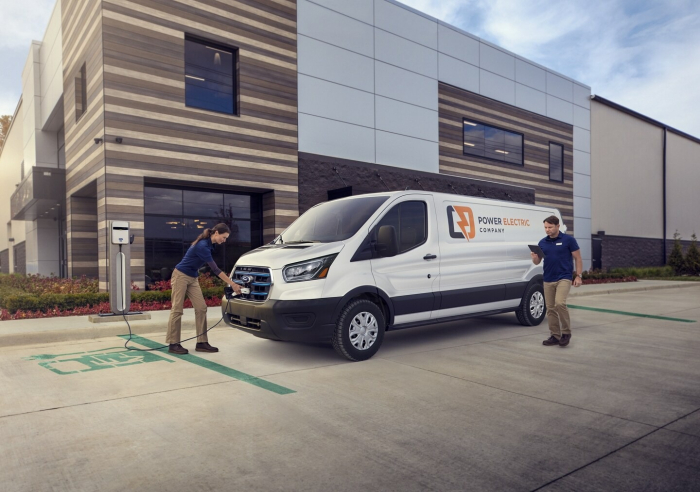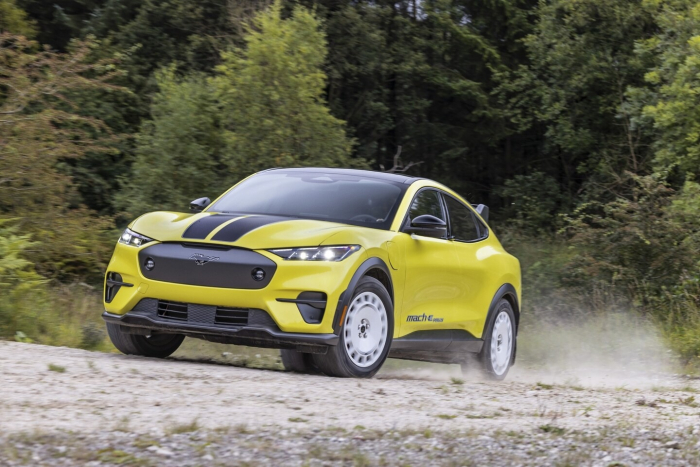LG Energy to supply batteries for Ford's electric commercial vehicles
LG Energy to make cells, modules for Ford in Poland, shift battery production base for the Mustang Mach-E to Michigan
By Oct 15, 2024 (Gmt+09:00)
When in S. Korea, it’s a ritual: Foreigners make stops at CU, GS25, 7-Eleven


Maybe Happy Ending: A robot love story that rewrote Broadway playbook


NPS yet to schedule external manager selection; PE firms’ fundraising woes deepen


Samsung steps up AR race with advanced microdisplay for smart glasses


Seoul appeal: Korean art captivates Indonesia’s affluent connoisseurs



LG Energy Solution Ltd., the world’s third-largest electric vehicle battery manufacturer, is set to supply battery cells and modules to US Ford Motor Co. through 2032 in deals estimated at $9.5 billion, fueling hopes for the South Korean company’s recovery amid the prolonged slowdown in the eco-friendly automobile market.
LG Energy said on Tuesday it signed two contracts to provide battery cells and modules of 109 gigawatt-hours (GWh) in total for Ford's electric commercial vehicles. The leading South Korean battery maker plans to supply 75 GWh from 2027 to 2032 for one deal and 34 GWh from 2026 to 2030 for the other contract.
The value of the deals was estimated at about 13 trillion won ($9.5 billion) based on current cell prices, industry sources in Seoul said, while LG Energy and Ford have yet to unveil financial details.
The deals included the supply of products that LG Energy and Ford had aimed to manufacture at their planned battery manufacturing joint venture in Turkey, LG Energy said. The plan of the joint venture was scrapped last year due to the protracted weakness in the global EV industry.
LG Energy is set to supply pouch-type nickel, cobalt, manganese and aluminum batteries to Ford, which is expected to use all of them for the E-Transit, according to industry sources in Seoul.
The battery supply volume is likely to be enough for more than 1 million units of the all-electric van as it is equipped with batteries of 84 kilowatt-hours (kWh) per unit.
TO MANUFACTURE IN POLAND
LG Energy plans to produce the batteries for Ford’s electric commercial vehicles at its plant in Wrocław, Poland, which has been producing cells for the US automaker’s electric sport utility vehicle Mustang Mach-E.
“The major battery supply deal with Ford is expected to enhance competitiveness in winning orders and significantly contribute to improving production efficiency at the Polish factory,” said LG Energy.
The facility’s operation was estimated at only about 60% due to sliding EV sales in Europe, the world’s second-largest EV market, hurting LG Energy’s earnings.
The company aims to increase its run by manufacturing various products such as lithium iron phosphate (LFP) models and energy storage system (ESS) batteries there.
LG Energy agreed with Ford to produce batteries for the Mustang Mach-E at its plant in Michigan next year, instead of the Polish facility.
The move is expected to accelerate the two companies’ growth in the US with Washington providing EV buyers with subsidies of up to $7,500 per vehicle assembled in North America.

EUROPEAN ELECTRIC COMMERCIAL VEHICLE MARKET
LG Energy is predicted to expand its presence in the European electric commercial vehicle market with the battery supply deal with Ford, a leading commercial vehicle maker in the region, industry sources in Seoul said.
Electric commercial vehicles were forecast to make up about 50% of automobiles transporting goods or paying passengers such as trucks and vans in Europe by 2030, LG Energy quoted industry research firm LMC Automotive as saying.
“Capitalizing on our local production capacity, we will secure leadership in the European market and deliver unmatched values to our customers through advanced battery technologies that effectively address diverse needs,” said LG Energy Chief Executive Kim Dong-myung in a statement.
Electric commercial vehicles require more batteries than passenger cars due to their longer mileage. Those eco-friendly commercial vehicles are not often replaced even though they operate in harsh environments such as heavy snow and rain.
That leads automakers to favor batteries with stronger outputs and longer life, creating a profitable and stable market for cell manufacturers with long-term and higher-value contracts, industry sources in Seoul said.
“It is difficult for the battery industry to enter the electric commercial vehicle market with high profitability as they require much better specs than those for (electric) passenger cars,” said an LG Energy official. “The Ford deal indicates that LG Energy’s products have secured competitiveness in performance and quality to meet customers’ tough requests.”
Write to Hyung-Kyu Kim, Woo-Sub Kim and Jin-Woin Kim at khk@hankyung.com
Jongwoo Cheon edited this article.
-
 BatteriesLG Energy to supply EV batteries to Mercedes-Benz in N.America
BatteriesLG Energy to supply EV batteries to Mercedes-Benz in N.AmericaOct 08, 2024 (Gmt+09:00)
2 Min read -
 BatteriesLG Energy, Ford’s battery JV in Turkey scrapped as EV uptake slows
BatteriesLG Energy, Ford’s battery JV in Turkey scrapped as EV uptake slowsNov 12, 2023 (Gmt+09:00)
3 Min read -
 BatteriesFord, LG Energy to build Turkey EV battery plant for Europe
BatteriesFord, LG Energy to build Turkey EV battery plant for EuropeFeb 22, 2023 (Gmt+09:00)
2 Min read -
 AutomobilesLG Energy to double Ford battery pack production line in Poland
AutomobilesLG Energy to double Ford battery pack production line in PolandJul 22, 2022 (Gmt+09:00)
3 Min read


